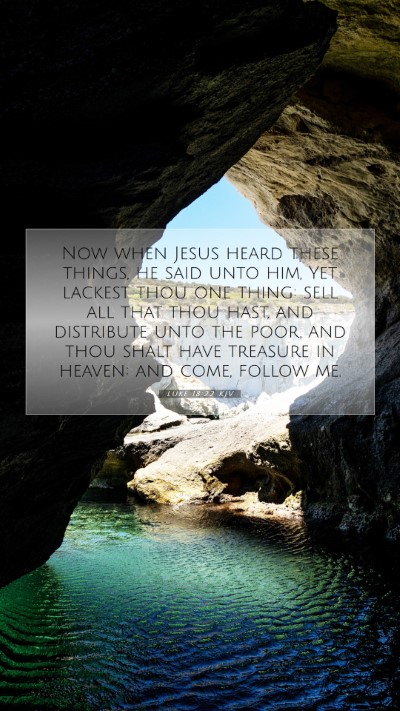Bible Verse Meaning of Luke 18:22
Verse Text: "When Jesus heard this, he said to him, 'You still lack one thing. Sell everything you have and give to the poor, and you will have treasure in heaven. Then come, follow me.'" (Luke 18:22, NIV)
Overview
This profound statement made by Jesus offers a significant lesson on the nature of true discipleship and the relationship between wealth and spiritual fulfillment. In Luke 18:22, Jesus challenges a rich ruler who believes he has kept the commandments but lacks the commitment necessary for eternal life.
Bible Verse Commentary
-
Matthew Henry's Commentary:
Henry emphasizes the rich young ruler's sincere desire for eternal life but points out his blind spot—his attachment to wealth. He notes that by instructing him to sell all he has, Jesus identifies the idol that stands between the ruler and complete devotion to God. This narrative illustrates that material possessions can hinder one's spiritual journey and that true discipleship often requires significant sacrifice.
-
Albert Barnes’ Commentary:
Barnes focuses on the necessity of renunciation of worldly goods as a requirement to follow Jesus. He argues that this moment cautions believers against the deception of relying on their achievements or possessions for righteousness. In his view, Jesus’ directive serves to reveal the ruler's heart, exposing a deeper need for humility and dependence upon God's grace.
-
Adam Clarke's Commentary:
Clarke elaborates on the implications of Jesus’ command, suggesting that the act of selling one's possessions and giving to the poor is a tangible demonstration of faith and commitment. He stresses that the call to follow Jesus entails more than mere adherence to laws; it requires a complete transformation of priorities, putting the needs of others alongside one’s faith in God. Clarke also comments on the ‘treasure in heaven’ concept, indicating that spiritual wealth far exceeds any earthly riches.
Understanding Scripture
The significance of Luke 18:22 transcends its immediate context. It reflects core biblical themes regarding wealth, priority, and the essence of discipleship. Below are deeper insights drawn from traditional commentaries:
-
Materialism vs. Spirituality:
This verse confronts the scripture’s recurring theme that one cannot serve both God and money (Matthew 6:24). Jesus’ demand for radical action highlights how wealth can become a barrier to spiritual fulfillment. By asking the ruler to sell his possessions, Jesus points to the necessity of prioritizing spiritual wealth over temporal riches.
-
The Cost of Discipleship:
Jesus’ statement underscores that following Him requires a willingness to abandon anything that competes with one’s devotion to God. This teaching is consistent with other scriptural admonitions regarding the sacrifices needed in the life of a believer (Luke 9:23, Matthew 16:24).
-
Call to Serve:
Giving to the poor embodies the heart of Christian love and service. The notion of 'treasure in heaven' serves as a reward for such sacrifice, emphasizing that our earthly actions have eternal consequences (1 Timothy 6:18-19).
Application in Daily Life
The teachings of Luke 18:22 encourage a reflective assessment of one’s priorities. Each believer is called to ask themselves what might be hindering their relationship with God. Here are some practical applications:
- Self-Examination: Regularly assess your attachments. What possessions or relationships are competing with your devotion to God?
- Generosity: Consider ways to express generosity in your community. Are you supporting those in need through your time, talents, or resources?
- Follow Jesus’ Example: Just as Jesus called His followers to step out in faith, look for opportunities to follow His example in bold actions for the benefit of others.
Bible Cross References
- Matthew 19:21: Analogue teaching on the same principle of giving up riches.
- Mark 10:21: Similar account emphasizing Jesus’ love for the young ruler before His challenge.
- James 2:5: Encouragement to the poor being rich in faith.
Conclusion
Luke 18:22 serves as a profound reminder of the cost of discipleship and the pitfalls of materialism. By examining the commentary from historical biblical scholars, we can gain a greater understanding of this pivotal teaching of Jesus. It invites us to question our own lives: What sacrifices are we willing to make to follow Jesus wholeheartedly?


